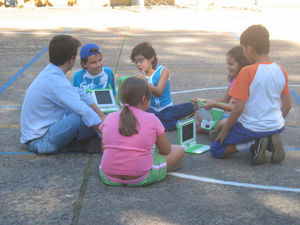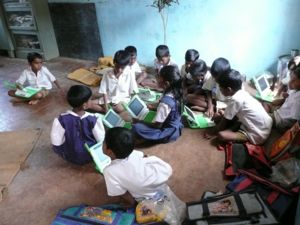Educators
Welcome
One Laptop per Child is an education project, not a laptop project. Our goal is to provide children with access to libraries of knowledge, ideas, experiments, and art. Our hope is that this material will act as a window into the world, complete with examples and references on which to build.
This page is designed for the community of educators who are interested in contributing to these libraries of knowledge, and supporting the community of teachers using XOs in their classrooms. If you are a teacher currently using (or about to use) XOs in your classroom, you may be interested in the community page for XO Teachers.
Already, hundreds of prototype laptops have been distributed to children in pilot schools around the world. This summer, the final "B4" beta-test laptop will go (went?) out to another thousand children. The production prototypes are done, and the first real production run is planned to begin in the next few weeks (Oct?).
It's an exciting time to get involved with OLPC. This page is designed to help you get started.
Highlights
- OLPC Peru/Arahuay, which gives a good overview of a trial.
- The Uruguay/Cardal blog, which discusses the ongoing trial in OLPC Uruguay/Cardal.
- Khairat Chronicle from the Khairat school pilot in Maharashtra India.
Some trials
| Porto Alegre OLPC Brazil |
Galadima OLPC Nigeria |
Ban Samkha OLPC Thailand |
|---|---|---|
File:Hiking02.jpg Ban Samkha is a rural village in northern Thailand | ||
| Cardal OLPC Uruguay |
Arahuay OLPC Peru |
Khairat school OLPC India |
"Pupils go even beyond what I can teach in the class. It's a very interesting thing to use. I personally have a better idea about teaching... We discovered that giving them time to discover something and to do it in their own way, they feel more happy and they are so excited in using it that, 'Yes, I discovered it! Yes, I can get it!! Yes, I can do this on my own!!!' Teaching is getting more interesting and less stressful." — Mr. O., Galadima School, Abuja, Nigeria
A note of context: TRIAL-2 is just now getting started, so most of these links (currently all) are from TRIAL-1. Which mostly used very limited (pre-alpha) software, on mainly early, more limited hardware prototypes. So the answer to why they aren't making greater use of their Journals, and online collaborative capabilities, is they mostly didn't have them yet.
Vision
The XO laptop will bring a world of new ideas, images, and materials to children around the world. It will also provide students and teachers with new ways to collaborate, create, and transform works over time. Our belief in collaboration as a fundamental part of learning underscores our commitment to editable document formats, revision tracking, and careful attribution of authors and sources.
All of our projects are collaborative, and this wiki is where each of our projects takes shape. If you take a look around, you'll find projects in all stages of completion-- from rough outlines and meeting notes to detailed workplans and polished documents. Feel free to contribute your ideas and expertise to any project that interests you. We're counting on you to make OLPC a success.
To learn more about our model for content creation, our network of curators, and our plan for school servers that will host (and share) each school's digital library, visit Content. Otherwise, keep reading to find out how you can join in.
Join In
What are some interesting things to do first?
- Read about the OLPC Learning Vision to learn more about why we think children in developing countries need laptops and what we think laptops will enable them to do.
- Visit the OLPC Education Portal.
- Read an overview of our current pilot programs, visit the OLPC Ceibal blog, or read field notes from Nigeria and Thailand.
- Familiarize yourself with our ideas about content and collaboration, and the various Creative Commons licenses. As a rule, we want educational materials produced for and connected with OLPC to be free and open source.
- Contribute ideas (you can learn about contributing to a wiki ...where??).
And then what?
Play, learn, explore, exchange-- you can do anything you want! Here are some ideas to help you get started.
- Eventually, the following sub-categories should each have their own page... --Lauren 18:51, 6 July 2007 (EDT)
Join the community
- Create an account on the OLPCWiki!
- Add yourself, or your organization, to the educator Roll Call page.
- Add an educator user box to your user page.
- Create an educational organization page for your organization, group, or school.
- Find a project that excites you.
Contribute content
- Read about the content repository that will reside on the school servers.
- Add to the list of ideas for content that should be included in the repository.
- Contribute your content directly to OLPC by following these instructions.
Create activities
- Read the educational activity guidelines to learn about the features of the XO that pertain directly to educators.
- Explore our repository of activity outlines and lesson plans.
- Contribute to our collection of story-based learning activities.
- Create a new activity, either based on one of our sample learning activities or entirely from scratch.
Frequently Asked Questions
Ask a question and someone will try to answer it.
Adults learning computer skills
Hello. Can anyone tell me if these machines are appropriate for adults who want to learn computer skills? For example, can these laptops run MS Word, MS Excel, etc.????
- It is not clear what the correlation is between learning computer skills and the availability of MS Word, etc. MS Office apps don't run on Linux, however, there is a word processor on the laptop and the Google apps run on the laptop. --Walter 21:16, 23 October 2007 (EDT)
This tool is not for adults and learning computer skills! This machine is design for the children; and with that in mind, an entirely new interface was created. Look into the Journal application to find out more about what this new tool can do for children all over the world... - Alex Maloutas Sat 11/24/07 2:20pm
Standalone operation?
Question: I heard that you can give one and get one for $400. What I would like to know is if this laptop will work standalone without being connected to a school server. Can my kid browse the web where there is a free Wi-Fi hotspot? What about educational software - do they run standalone ?
- Yes. Yes. Plus, if there are multiple laptops in an area, they can "share" without the need to be connected to either a school server or the internet. --Walter 11:10, 30 October 2007 (EDT)
Mix OLPC and Laptops?
Question: I bought an OLPC under the Give One Get One program to pilot at a school. Is it possible to mix an OLPC machine and a Linux machine in an non-emulation mode and create a mesh?
- Creating a mesh network relies on special wireless hardware and software that is currently available only on the XOs. However, since the XOs really are special Linux laptops, you can definitely share activities between the XOs and another laptop running the same software so long as you are both connected to the same Jabber server.
Comments and Discussion
Regarding the Laptop Revolution
Please leave comments on the Educators talk page.




